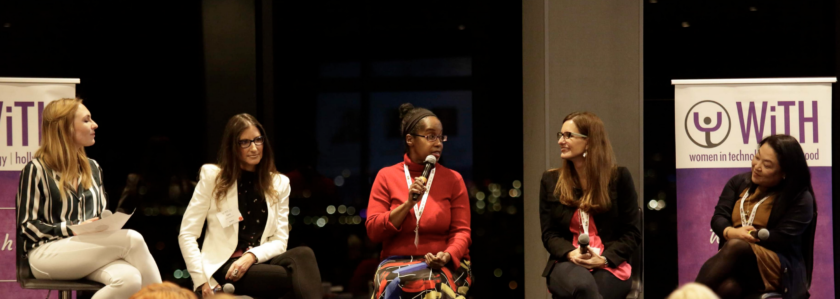HITS

M&E, Tech Execs Provide Tips on How Women Can Step Up Their Networking Game
Story Highlights
Networking is a crucial part of everybody’s professional career in the media and entertainment (M&E) sector, but women are often at a disadvantage when it comes to networking, in part because of the relatively small number of women in the industry — especially in technical roles.
But female executives provided some helpful networking tips to women in the industry and shared some of their success stories Dec. 5, during a Women in Technology: Hollywood (WiTH) workshop panel session called “Your Network is your Net Worth,” held in conjunction with the annual Content Protection Summit, presented by the Content Delivery & Security Association (CDSA).
A recent study conducted by university researchers Sofia Bapna and Russell Funk said women had worse networking outcomes than men, meeting 42% fewer new contacts, spending 48% less time talking to them, and adding 25% fewer connections on LinkedIn, according to WiTH.
The agenda for the WiTH workshop was “deliberately designed to cause a non-linear, 10-fold breakthrough in your networking game,” it said ahead of the event.
One of the many valuable tips executives on the panel provided was to not always assume a particular person at a company was absolutely the best person for you to speak to. They also urged women to tell the people with access to an executive exactly what they’re looking to contact that power player about, such as information about a job, and ask who the best person to speak to about that topic is at a company.
The panelists also pointed out that many people don’t like networking, but you have to do it, or you won’t be able to offer as much value to your company and the job you have because your network makes you more valuable. Another great idea is to check to see how contacts are doing every now and then to maintain the relationships and know what they’re up to. You can even wish a contact good luck before they speak at a conference.
Among the other tips provided: don’t just network when looking for a job; always be courteous; send thank you notes if somebody has helped you; and specify how you know a person you’re contacting for the first time, including where you met (if you indeed met that person), so that you’re more likely to get a warm reception or a response at all.
It can also be very beneficial to research who will be at a conference or other networking event to see if there is anybody in particular worth meeting there. But panelists stressed that you should do your homework on what that person does exactly so it’s more likely that you can have an actual, meaningful conversation with them if you do indeed meet at the event.
On that front, Katherine Vogt, a human resources (HR) business partner leader at LinkedIn, recalled that she wanted to meet with the head of HR from a company she’s “very brand loyal to.” So, she changed her schedule around to attend a conference that person was going to be at and introduced herself there. That person agreed to connect with her on LinkedIn, she recalled, adding that proves “sometimes you just kind of have to hustle.”
But she stressed it was important to “do it in the right way — you don’t want to be super-obnoxious” after all. “It was a successful light stalking,” she joked.
One additional thing to keep in mind, according to the panelists: Everybody feels insecure at least part of the time. Nobody wants to be alone and excluded, so why not try to connect with people when attending networking events?
The other panelists were Toshino Yuhaku, a digital media executive and 20-year veteran of Sony; Diana Means, founder of the Alliance of Women Filmmakers and director of the Los Angeles Women’s International Film Festival; and Tami Holzman, author of the book “From C-Student to the C-Suite” and a frequent speaker on female empowerment at conferences. The panel was moderated by Madeline Mann, director of people operations at Venice, Calif.-based blockchain startup Gem and founder of the Self Made Millennial YouTube Channel.









